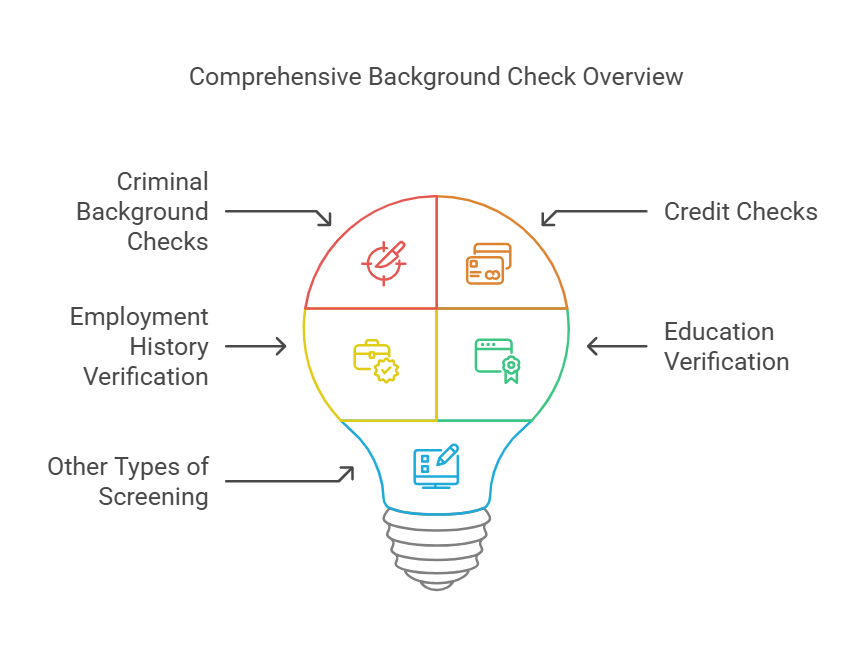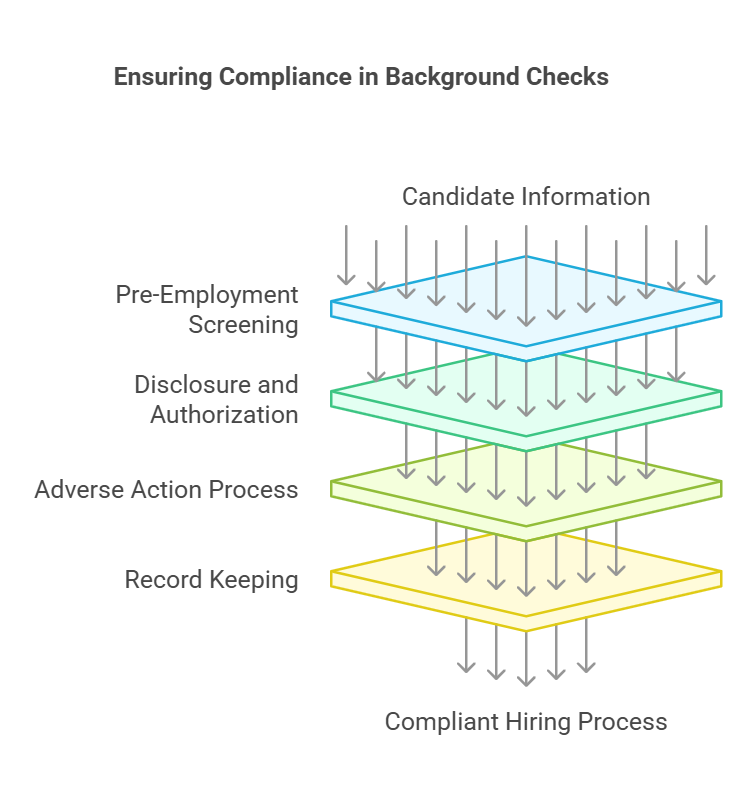Navigating the intricacies of background check laws can be quite overwhelming for businesses. Understanding and adhering to local regulations is crucial for Tennessee employees to ensure compliance and foster a fair hiring process. This guide is designed to help business owners, HR professionals, recruiters, and job seekers across industries like staffing, healthcare, transportation, tenant screening, non-profit, retail, technology, and hospitality align with Tennessee's background check requirements.
Key Takeaways
- Conducting compliant background checks in Tennessee is crucial for avoiding legal repercussions, financial penalties, and reputational damage.
- Tennessee employers must comply with state-specific statutes like the Tennessee Human Rights Act (THRA) and federal regulations such as the Fair Credit Reporting Act (FCRA) and EEOC guidelines.
- Various types of background checks, such as criminal history, credit checks, employment history, and education verification, are permissible, but each must be conducted fairly and legally.
- Adhering to best practices, including pre-employment screening, disclosure and authorization, adverse action process, and secure record keeping, ensures a compliant hiring process.
- Different industries have specific background check requirements, so employers must understand and implement industry-specific screening protocols to maintain compliance and mitigate risks.
Introduction
Background checks play a vital role in modern hiring processes, serving as a common practice to verify the integrity and suitability of potential employees. For businesses operating in Tennessee, conducting background checks isn't just about gathering information; it's about complying with a complex web of state-specific statutes and regulations. Missteps can lead to legal repercussions, financial penalties, and reputational damage.
This guide aims to demystify Tennessee's background check laws, offering practical tips to help businesses navigate these requirements effectively. Whether you're an HR professional, a recruiter, or a business owner in industries ranging from healthcare to hospitality, this resource is designed to ensure your hiring practices are both compliant and fair.

The Legal Landscape of Background Checks in Tennessee
Understanding Tennessee Background Check Laws
Regarding background checks in Tennessee, businesses need to navigate a well-defined regulatory landscape. Unlike some states with more lenient laws, Tennessee has specific guidelines that employers must follow for performing background screenings. One of the key regulations is the Tennessee Human Rights Act (THRA), which aims to prevent discriminatory practices in hiring. Businesses must align their background check procedures with the THRA to avoid potential legal pitfalls. This means ensuring that background checks are conducted fairly and without bias, focusing solely on the relevance of the information to the job in question.
Federal Laws Impacting Tennessee Employers
Navigating Tennessee state laws alone isn't enough; federal regulations also significantly shape how background checks should be conducted. Two primary federal regulations to be aware of are the Fair Credit Reporting Act (FCRA) and the Equal Employment Opportunity Commission (EEOC) guidelines.
Fair Credit Reporting Act (FCRA)
The FCRA sets out the rules for acquiring and using consumer reports, which include credit and background checks. For Tennessee employers, compliance with the FCRA is non-negotiable. Employers must obtain clear, written consent from candidates before conducting a background check. They must notify the candidate if any adverse action is to be taken based on the findings of that check. This includes providing a pre-adverse action notice, a copy of the background check report, and a summary of the candidate’s rights under the FCRA. For a more comprehensive look at the FCRA, check out this resource: Understanding FCRA Compliance.
Equal Employment Opportunity Commission (EEOC) Guidelines
The EEOC guidelines are designed to prevent discrimination in the workplace, including during the background check process. Employers must ensure their background checks do not disproportionately exclude certain protected groups unless the exclusions are job-related and consistent with business necessity. The EEOC also emphasizes the need for an individualized assessment when adverse decisions are based on criminal records. This means considering the nature of the offense, the time elapsed since the offense, and its relevance to the job. For further details, refer to the EEOC’s official guidelines.
By understanding both state and federal regulations, businesses in Tennessee can ensure they perform background checks that are thorough, fair, and legally compliant. This dual approach helps foster a fair hiring process and reduces the risk of legal repercussions.
EXPERT INSIGHT: Having worked in human resources for a long time, I can attest that following background check regulations is not just required by law but also a smart business move. Employers are encouraged to promote an open and fair recruiting process by adhering to both federal and state laws in Tennessee. In order to reduce risk and improve organizational integrity, executives must stay ahead of regulatory developments and make sure their background check practices are both fair and lawful. This proactive strategy fosters a trusting workforce, which supports sustained achievement and a favorable company image. - Charm Paz, CHRP
Types of Background Checks Permitted in Tennessee

Criminal Background Checks
Criminal background checks are a staple in the hiring process for Tennessee businesses. These checks can reveal a candidate’s criminal history, including arrests, convictions, and incarcerations. It’s critical to understand the scope of what you can access and how you can use this information in your hiring decisions. Tennessee law allows businesses to review felonies and misdemeanors. However, always be mindful of the Tennessee Human Rights Act (THRA), which prohibits discrimination based on arrest records that do not lead to a conviction. Ensure your process is transparent and consistent to protect against potential complaints.
Credit Checks
Credit checks are a bit more nuanced. They’re permissible under Tennessee law, but only if they’re relevant to the job role. For instance, if the position involves financial responsibilities, checking a candidate’s credit history is reasonable. Remember, the Fair Credit Reporting Act (FCRA) requires you to inform the candidate and get their consent before pulling their credit report. Transparency is key here—explain why the credit check is necessary and how results will influence the hiring decision.
Employment History Verification
Verifying employment history is straightforward but essential. Contacting previous employers to confirm job titles, dates of employment, and reasons for leaving helps you validate a candidate’s resume. Tennessee doesn’t impose extra restrictions on this practice, but seeking the candidate’s consent beforehand is good to avoid any privacy issues. A consistent process for all candidates ensures fairness.
Education Verification
Just like employment history, verifying educational credentials is crucial. This can prevent any discrepancies regarding degrees earned or schools attended. Tennessee businesses aren’t subject to special regulations here, but accuracy is non-negotiable. Always procure consent and handle educational records with care to maintain compliance.
Other Types of Screening
Tennessee allows for additional screenings tailored to the needs of specific industries. Drug testing is common in sectors like transportation and healthcare. Ensure that your drug testing protocol aligns with both federal regulations and Tennessee state laws. Similarly, driving record checks are vital for roles that involve vehicle operation. For other specialized roles, consider industry-specific checks such as professional license verification. Each type of screening ensures your potential hires are reliable and fit the role’s requirements.
By ensuring that each of these background checks aligns with both state and federal laws, Tennessee employers can build a strong, compliant hiring process while fostering a trustworthy workforce.
Compliance Best Practices for Tennessee Employers
Navigating the complexities of background check compliance in Tennessee doesn’t have to be a headache. Here are some straightforward, vital practices to keep your hiring process compliant and efficient.

Pre-Employment Screening
Getting your pre-employment screening process right is crucial. Start by standardizing your screening procedures based on role-specific requirements. Use tools and templates from trusted HR resources, like those provided by SHRM, to craft a consistent approach. Always verify the applicant’s identity at the outset to avoid complications later. Remember, consistency helps mitigate bias and ensure fairness across the board.
Disclosure and Authorization
Before conducting any background check, informing the candidate and obtaining their consent is legally mandatory. Make this step simple. Provide a clear, standalone disclosure form and an authorization form for the candidate’s signature. This practice not only complies with the Fair Credit Reporting Act (FCRA) but also builds trust with your potential hires. Including easily understandable language about what will be checked can demystify the process for candidates.
Adverse Action Process
If the background check reveals information that may lead to a negative hiring decision, adhere to the prescribed adverse action process. This involves sending a pre-adverse action notice to the candidate, a copy of the background check report and the document “A Summary of Your Rights Under the FCRA.” Give the candidate a reasonable period to respond or dispute the findings. If you decide to proceed with the adverse action, send a final notice outlining the decision. Detailed guidelines can be found in Ensuring Compliance in Employment Background Checks.
Record Keeping and Confidentiality
Maintaining and protecting candidate information is not only a best practice but a legal requirement. Store electronic records securely and limit access to those who truly need it. Physical documents should be kept locked away. Tennessee law and federal regulations require you to keep records for a specific duration—typically at least one year. Ensure you’re familiar with these timeframes and have a reliable system for purging records accordingly. Confidentiality is key; always handle all candidate information with the utmost discretion.
Integrating these practices into your hiring process establishes a robust foundation for compliance. This keeps legal headaches at bay and promotes a transparent and fair hiring environment, fostering trust and safety from the ground up.
How Far Back Does a Background Check Go in Tennessee?
In Tennessee, background checks typically go back seven years. For certain jobs, particularly those in sensitive or regulated fields, the look-back period can be longer.
How Long Does a Background Check Take in Tennessee?
Background checks in Tennessee generally take three to five business days to complete, but this can vary based on the comprehensiveness of the check and the availability of records.
Industry-Specific Considerations
Background checks can vary significantly depending on the industry, and Tennessee has specific compliance requirements for different sectors. Understanding these nuances will help you perform thorough and lawful checks.
- Staffing Agencies: Given the high volume of candidates, staffing agencies must streamline background checks while maintaining compliance. Automating parts of the process can save time, but ensuring all automated actions meet legal standards is essential. The Fair Credit Reporting Act (FCRA) and the Tennessee Human Rights Act (THRA) are at the top of my mind here.
- Healthcare: Compliance in healthcare often means navigating specific checks like those required by the Office of Inspector General (OIG) exclusion list. These checks ensure that healthcare professionals aren't disqualified from participating in federally funded health programs. Verifying credentials and licensure status is critical and must align with Tennessee state regulations.
- Transportation: Transportation workers need to conduct Department of Transportation (DOT) mandated checks, including driving history and drug tests. Ensuring these checks are current, especially given the safety implications, can be a matter of legal necessity and public safety.
- Tenant Screening: For landlords and property managers, tenant background checks must align with the Fair Housing Act and state-specific laws. Background checks can cover credit history, criminal records, and rental history, but they must avoid discriminatory practices. Knowing what you can legally discover and disclose is critical.
- Non-Profit Organizations: Non-profits that rely on volunteers must ensure proper screening while considering the unique legal implications of unpaid roles. This might include checks comparable to those for paid employees, especially in roles involving vulnerable populations like children or seniors.
- Retail: The retail sector often employs a diverse workforce, demanding particular attention to theft and fraud prevention. Using retail theft databases appropriately and staying compliant with the FCRA’s requirements on reporting and usage is essential.
- Technology: Tech companies often require high-level screenings, especially for sensitive data or intellectual property positions. Compliance here means thorough vetting without infringing on privacy rights and ensuring any adverse information used is accurate and relevant.
- Hospitality: Background checks in hospitality focus on customer-facing roles and involve criminal background checks, drug screenings, and employment verification. Properly assessing potential hires in this sector helps ensure a safe and pleasant environment for customers.
By recognizing the specific requirements and best practices unique to your industry, you can better align your background screening process with Tennessee laws and regulations, thereby minimizing risks and promoting a secure and compliant hiring environment.
Additional Research: The Tennessee Human Rights Act (THRA) prohibits discrimination in employment, housing, and public accommodations based on race, creed, color, religion, sex, age (over 40), national origin, and disability. It is enforced by the Tennessee Human Rights Commission (THRC), which ensures compliance and investigates complaints. The THRA is comparable to federal laws like Title VII of the Civil Rights Act of 1964 and aims to protect individuals from discriminatory practices in the state. For more information, visit the Tennessee Human Rights Commission website.
Tennessee Background Check Resources
Here is a table of related Tennessee government websites that would be useful for Tennessee business owners interested in background checks:
| Website Name | URL | Description |
|---|---|---|
| Department of Labor and Workforce Development (Tennessee) | https://www.tn.gov/workforce | Offers resources on labor laws, employment regulations, and licensing affecting background checks. |
| Bureau of Investigation (TBI) (Tennessee) | https://www.tn.gov/tbi | Provides access to criminal history records and background check information. |
| Administrative Office of the Courts (Tennessee) | https://www.tncourts.gov | Access to court records and legal information relevant to background checks. |
| Department of Correction (Tennessee) | https://www.tn.gov/correction | Information on criminal records, parolees, and public safety concerns. |
| Attorney General's Office (Tennessee) | https://www.tn.gov/attorneygeneral | Offers guidance on legal matters, including consumer protection and employment law. |
| Department of Economic and Community Development (Tennessee) | https://www.tn.gov/ecd | Provides resources for business development and compliance with state regulations. |
| Department of Safety and Homeland Security (Tennessee) | https://www.tn.gov/safety | Information on state safety policies and data privacy for handling sensitive background check data. |
| State Library and Archives (Tennessee) | https://sos.tn.gov/tsla | Access to public records and historical documents useful for in-depth background research. |
| General Assembly (Tennessee) | https://www.capitol.tn.gov | Stay updated on laws and regulations passed by the state legislature that may affect background checks. |
| Department of Health (Tennessee) | https://www.tn.gov/health | Information on health regulations and requirements impacting employee screenings and background checks. |
These websites provide valuable resources and information to ensure Tennessee business owners comply with state laws and regulations when conducting background checks.
Frequently Asked Questions (FAQs)
Can I use arrest records in Tennessee background checks?
You cannot use arrest records that did not lead to a conviction when making employment decisions in Tennessee. The Tennessee Human Rights Act (THRA) restricts this practice to prevent discrimination. Only conviction records are generally considered permissible to use, and even then, they should be relevant to the job position in question. Furthermore, always stay updated with EEOC guidelines to ensure compliance across federal and state levels.
What should I do if a candidate disputes their background check results?
If a candidate disputes their background check results, the first step is to inform your background check service provider. You must re-investigate the disputed information promptly. Also, according to the Fair Credit Reporting Act (FCRA), you should give the candidate a reasonable period, typically 30 days, to resolve any discrepancies. During this period, reconsider any adverse employment actions based on the disputed information until the re-investigation is complete.
How long should I keep background check records?
Legally, you must keep background check records for a minimum of one year from the date of making a hiring decision. However, the EEOC recommends maintaining these records for at least three years as part of best practices. This helps ensure you can address any potential disputes or legal inquiries. Additionally, always store these records securely to protect candidate privacy and comply with data protection laws.
Do I need to perform background checks on all employees or just certain positions?
While it's not mandatory to perform background checks on all positions, defining and applying a consistent policy is crucial. Generally, positions of trust or those involving sensitive information, finance, healthcare, childcare, and customer-facing roles warrant thorough background checks. Ensure your policy is clear, non-discriminatory, and evenly applied to avoid allegations of bias or unfair hiring practices.
Conclusion
Compliance with Tennessee's background check laws isn't just a bureaucratic hoop to jump through—it's a fundamental part of building a trustworthy and legally sound workplace. By following the practical tips provided in this guide, employers can navigate the complexities of state and federal regulations effectively. This diligence helps avoid legal pitfalls and fosters a fair hiring process that benefits both the employer and the job candidate.
Stay proactive. With laws frequently evolving, staying informed and regularly reviewing your background check policies is crucial. Utilize the external resources and references provided, such as the EEOC guidelines and insights from industry experts. Continuous learning and updating your processes will pay off in the long run, creating a safer and more reliable working environment.
Ultimately, consistent and compliant background check practices contribute significantly to your business's integrity and reputation. They help mitigate risks and ensure that all hiring decisions are fair and legally sound. Let's commit to these best practices and set the standard for creating secure and inclusive workplaces across Tennessee.

GCheck Editorial Team
Meet the GCheck Editorial Team, your trusted source for insightful and up-to-date information in the world of employment background checks. Committed to delivering the latest trends, best practices, and industry insights, our team is dedicated to keeping you informed.
With a passion for ensuring accuracy, compliance, and efficiency in background screening, we are your go-to experts in the field. Stay tuned for our comprehensive articles, guides, and analysis, designed to empower businesses and individuals with the knowledge they need to make informed decisions.
At GCheck, we're here to guide you through the complexities of background checks, every step of the way.




